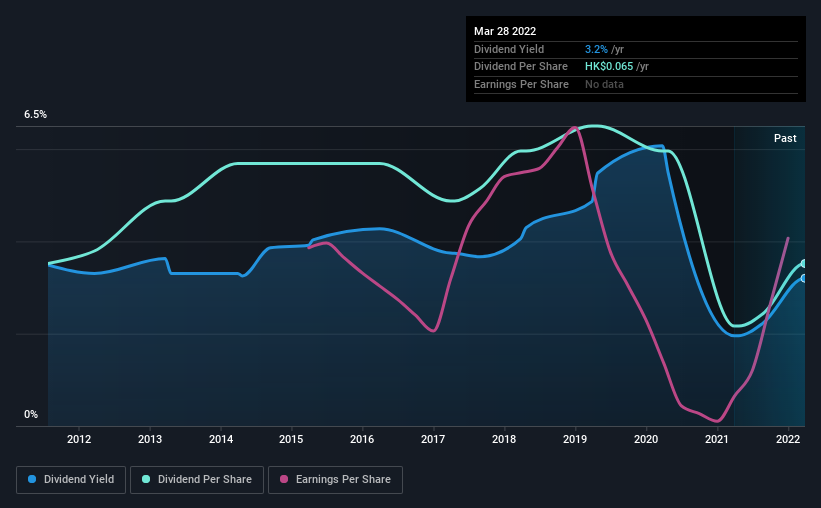- Hong Kong
- /
- Retail Distributors
- /
- SEHK:693
Tan Chong International's (HKG:693) Upcoming Dividend Will Be Larger Than Last Year's

The board of Tan Chong International Limited (HKG:693) has announced that it will be increasing its dividend on the 24th of June to HK$0.05. The announced payment will take the dividend yield to 3.2%, which is in line with the average for the industry.
Check out our latest analysis for Tan Chong International
Tan Chong International's Dividend Is Well Covered By Earnings
Unless the payments are sustainable, the dividend yield doesn't mean too much. However, prior to this announcement, Tan Chong International's dividend was comfortably covered by both cash flow and earnings. This means that most of its earnings are being retained to grow the business.
Looking forward, earnings per share could rise by 14.6% over the next year if the trend from the last few years continues. If the dividend continues along recent trends, we estimate the payout ratio will be 28%, which is in the range that makes us comfortable with the sustainability of the dividend.

Dividend Volatility
Although the company has a long dividend history, it has been cut at least once in the last 10 years. The most recent annual payment of HK$0.065 is about the same as the first annual payment 10 years ago. We're glad to see the dividend has risen, but with a limited rate of growth and fluctuations in the payments the total shareholder return may be limited.
The Dividend Looks Likely To Grow
With a relatively unstable dividend, it's even more important to evaluate if earnings per share is growing, which could point to a growing dividend in the future. It's encouraging to see Tan Chong International has been growing its earnings per share at 15% a year over the past five years. A low payout ratio and decent growth suggests that the company is reinvesting well, and it also has plenty of room to increase the dividend over time.
Tan Chong International Looks Like A Great Dividend Stock
In summary, it is always positive to see the dividend being increased, and we are particularly pleased with its overall sustainability. The company is easily earning enough to cover its dividend payments and it is great to see that these earnings are being translated into cash flow. All of these factors considered, we think this has solid potential as a dividend stock.
Investors generally tend to favour companies with a consistent, stable dividend policy as opposed to those operating an irregular one. Still, investors need to consider a host of other factors, apart from dividend payments, when analysing a company. To that end, Tan Chong International has 2 warning signs (and 1 which makes us a bit uncomfortable) we think you should know about. Is Tan Chong International not quite the opportunity you were looking for? Why not check out our selection of top dividend stocks.
Valuation is complex, but we're here to simplify it.
Discover if Tan Chong International might be undervalued or overvalued with our detailed analysis, featuring fair value estimates, potential risks, dividends, insider trades, and its financial condition.
Access Free AnalysisHave feedback on this article? Concerned about the content? Get in touch with us directly. Alternatively, email editorial-team (at) simplywallst.com.
This article by Simply Wall St is general in nature. We provide commentary based on historical data and analyst forecasts only using an unbiased methodology and our articles are not intended to be financial advice. It does not constitute a recommendation to buy or sell any stock, and does not take account of your objectives, or your financial situation. We aim to bring you long-term focused analysis driven by fundamental data. Note that our analysis may not factor in the latest price-sensitive company announcements or qualitative material. Simply Wall St has no position in any stocks mentioned.
About SEHK:693
Tan Chong International
An investment holding company, provides vehicles and related spare parts in Singapore, Taiwan, the People’s Republic of China, Japan, Thailand, and internationally.
Good value with proven track record.
Market Insights
Community Narratives



